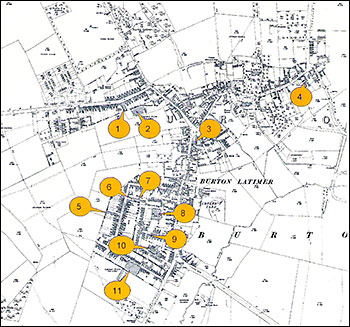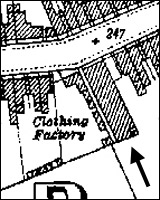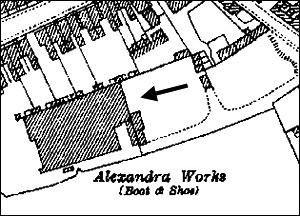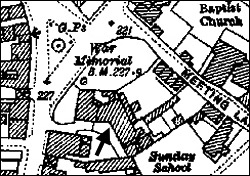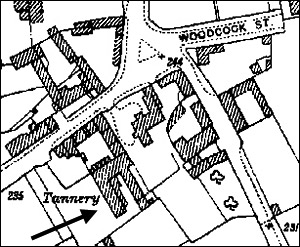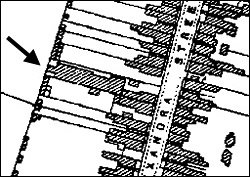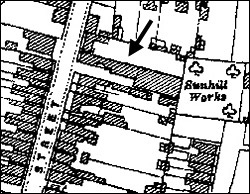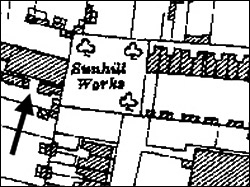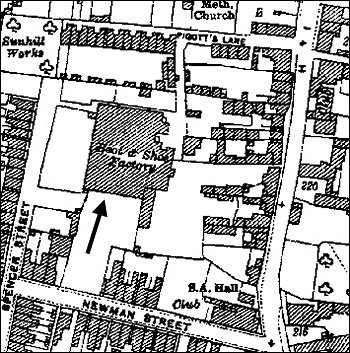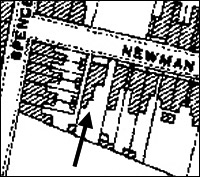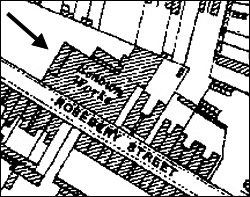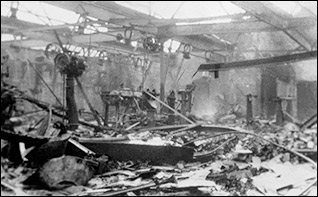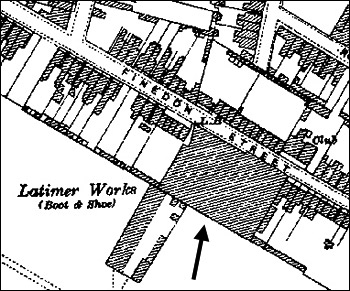| Original article by Douglas Ashby 1999, transcribed by Margaret Craddock with later additions | ||||
|
||||
|
||||
|
The footwear trade started in Burton Latimer in a small way in the 1870s when men would do outdoor work in the barns behind their homes. Leather would be brought by horse and cart from towns such as The population increase between 1871 and 1911 resulted in the town expanding to the south and west. What were formerly open fields and allotments were built on and became Finedon, Alexandra, Duke, Spencer, Rosebery and Newman Streets. These were to become the homes of the shoe workers and many of the houses have date and name stones to commemorate the period. The oldest business in Burton Latimer, Whitney & Westley Ltd, was established in 1896 by Joseph Westley and Harry Whitney who worked from a cottage in Profit margins were small, perhaps only one shilling on a pair of shoes. Mr Westley vowed that he would retire when he had made £50,000, which he accomplished. He died in 1957 at the age of 91, some 17 years after his partner, Mr Whitney, who died in 1940, aged 75. In 1969 a disastrous fire swept through the three-storey building. In the rebuilding, the top floor was removed. Sadly, the company closed in 1982 but shoe making continued at the factory until recently when we hear that the building is to be demolished and the site developed for housing. The misters Westley & Whitney have, however, left two fine reminders of their involvement with Burton Latimer. They built the two large Edwardian houses in In 1903, Buckby Brothers were established in the large factory that they built off the Coles Boot Co Ltd was formed in 1908 by John Wallace Coles. Its factory was approached from Known as the Coles Group it consisted of seven companies with two factories in Alexandra Street and Kettering Road; a warehouse in Station Road; a further factory in Finedon and closing rooms in Kettering and Wellingborough. They also had nine retail shops stretching from To everyone’s surprise, Coles sold out to Frank Wright Shoes of Kettering in 1974, who later disposed of the premises. Mr Coles died in 1970. Sudborough and Eady had a factory in Fox Brothers made heels for shoes at their premises at the end of During both World Wars the factories were busy, many of them making boots for the armed forces but their decline started in the 1960s. This was when cheap shoes, made abroad, started coming into the country making competition in the home market very fierce. There were also two leather tanneries in Burton Latimer: William Batty & Son had premises, now demolished, in Years ago, women would go to the factories to buy leather ‘bits’ to light the fires under their coppers to do the weekly washing, but this made the chimneys very sooty and loosened the bricks. Women factory workers would take their dinners to one or other of the bakehouses in the town to be cooked. Quite often, children would collect the dinners on their way home from school at lunchtime. Two notable bakehouses were Pownalls, in In the early days many of the factories had their own social clubs providing tennis, football and cricket teams. Coles even sported a women’s football team! The canteens provided cheap, cooked lunches and tea trolleys were pushed around to the various departments during the day. Until the 1960’s very few cars were to be found on the streets and workers came in by bus or cycled or walked to their jobs in the numerous factories in Burton Latimer. Today it is regrettable that what was once our staple trade and employed most of our townsfolk no longer exists. 1.
Used as a shoe warehouse by Buckby Bros.and later known as the "Pioneer Works" when occupied by Arthur Jones Ltd. and the Carrington Shoe Co. Ltd. in 1967. Originally the Kaycee Clothing factory from 1900 to the 1950s. The building became part of I.M. Kelly's, but when the firm left its adjacent main building in 2009 (see below) this building was also demolished along with that one. See also the feature on Burton's Clothing Industry |
||||
"Alexandra Works" Buckby Brothers, shoemakers, Kettering Road 1903 - 1960s. Later occupied by E.K. Coles, Alumasc and I.M. Kelly until 2009 when they moved to Kettering. The building was subsequently demolished. |
||||
3.
David James built this factory on the High Street for the manufacture of clothing c1874. Wallis & Linnell then used it for the same purpose c1885 to c1930. The Midland Box Co. had it until going into receivership in June 1941 and the premises were used by the military until the end of the war. Together with the shop premises on the front (now a restaurant), it was subsequently used by Compere Shoes and the Alliance Boot Company. See also the feature on Burton's Clothing Industry |
||||
William Batty & Son were leather manufacturers in Church Street from 1924 to the late 1970s, after which the factory was demolished. It is said that the site had originally been a small brewery operated by Battles of Cranford. |
||||
5. Built by Frederick Wallis, clothing manufacturer c1892.
After Wallis's it was owned by Thorneloe & Clarkson from the 1920s until 1953 when the premises were taken over by Individual Shoes Ltd., then taken over by Frank Wright Shoes in 1982 and closed in 1995. Soon afterwards it was bought by the present occupants Langham Industrial Controls. See also the feature on Burton's Clothing Industry |
||||
This Alexandra Street shoe factory was owned by William Harris until badly damaged by fire in 1898. Possibly occupied by Wallis Bros., shoe manufacturers, until c1910. From 1938 it was occupied by Mediator Shoes (part of Whitney & Westley Ltd.), then Beaufort shoes (Coles Group) and also Ian Roberts, tie manufacturers. Before it was eventually converted to housing, it was also occupied by Raybar Plastics, which made among other things, curtain wire, Trimryte (similar products), a jigsaw manuafacturer and a clog-maker. |
||||
7. "Spencer Works", sometimes "Sunhill Works" Spencer Street.
Thomas Edward and Albert Ernest Fox formed their leather dressing, heel and sole making business, known as Fox Brothers, in the early 1920s. The partnership was dissolved in 1932 when Albert left the firm but it still continued under the same name until the death of Thomas in 1951. Click here to see a photograph of Fox Bros. employees in 1938 The premises are now occupied by Sharnold Ltd. Toolmakers. |
||||
The Coles Boot Co.was established in 1908. Several other companies were formed as subsidiaries on other sites in the town. i.e. E.K.Coles, Beaufort Shoes, Individual Shoes, Compere Shoes, Ideal Shoes and the Alliance Boot Company. The business closed in the late 1970s and the factory was later occupied by Commercial Ignition Ltd. The factory closed in 2004 and was subsequently demolioshed. The site is now occupied by housing and named 'Coles Close'. |
||||
9. Newman Street.
Harry Miller was known to have had a lift-(heel) making factory in Newman Street which was destroyed by fire in 1911 |
||||
10. "Renown Works", Rosebery Street.
Started in 1901 by Alfred Sudborough and Joseph Eady who traded as Sudborough & Eady. The partnership was dissolved in July1913 when business became known as J. Eady & Sons. Alfred Sudborough then opened a factory with his son in Higham Ferrers. The Burton factory was destroyed by fire in the 1920s.
|
||||
"Latimer Works" Finedon Street. Whitney & Westley built their shoe factory in 1896 and, despite a serious fire in 1969, continued to make shoes there until the 1980s. Abbeyvogue and Mayfare Products later occupied the factory but it closed in 2000 and the site is now housing. |
||||
|
NOT ON THE MAP Off the map is Burton South Mill, situated near the bridge over the River Ise in Finedon Road. After being used as a corn mill for centuries, the premises were used by the Bedford Leather Co. and then C.E.& H.B. Groome Ltd., leather dressers, until destroyed by fire in 1936. The mill was one of the two Burton Latimer mills mentioned in the Domesday Book in 1089. Click here to read about Groome's Mill |
||||
13. The Burton Latimer Boot & Shoe Productive Society was formed in the late 1880s by members of the co-operative movement and manufactured army boots. It is not known where its premises were sited. It seems that at first hopes were high for the success of the enterprise and the following report was found in the Northampton Mercury dated 25 May 1894: A NEW FACTORY - A general meeting of the Boot and Shoe Society was held in the old School-room on Fridy, when it was decided to build a new factory next spring, their present premises not being large enough to carry on their increased trade. The society have purchased a corner plot on the building estate, having frontage to Finedon-street and Alexandra-street. However it appears that the business was not successful and this article was found in “Cooperative Production” by A.H. Dyke-Acland. 1894: "The Burton Latimer Society is another society producing for the use of the army. A co-operator, who paid a visit in midsummer, 1891, told me that the society was not flourishing, owing to the shortage of capital. At the end of 1891, it had 42 members with £690 of share capital. The sales for the year were £2,709, on which a loss of £126 was made. Since then I have been informed that the society has made over the business to a Mr. Haddon, the terms being a payment by him, to the shareholders, of 10s. in the pound on the share capital." In 1903, the following notice appeared in the London Gazette: Notice is hereby given, that the Registrar of Friendly Societies as, pursuant to the Industrial & Provident Societies Act 1893, this day cancelled the Registry of THE BURTON LATIMER BOOT AND SHOE PRODUCTIVE SOCIETY Limited (Register No. 2772 R), held at J.B.Nutt’s office, Burton Latimer, Kettering, in the county of Northampton, at its request. The Society (subject to the right of appeal given by the said Act) ceases to enjoy the privileges of a registered Society, which may be enforced against it as if such cancelling had not taken place, Dated this 28thday February, 1903 |
||||
